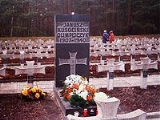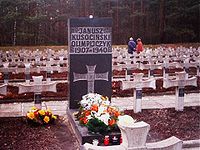
Janusz Kusocinski
Encyclopedia
Janusz Tadeusz Kusociński (born January 15, 1907 in Warsaw
– June 21, 1940 in Palmiry
) was a Polish
athlete, winner in the 10000 m event at the 1932 Summer Olympics
.
Born in Warsaw
into the family of a railroad worker, Janusz Kusociński, or Kusy as he was nickname
d, played football
for various Warsaw clubs as a schoolboy. He took up athletics in 1928 after joining the sport club "Sarmata". His coach there was the famous Estonia
n, decathlete
Aleksander Klumberg.
In his first competition at the Polish National Championships, Kusociński surprisingly won the 5000 m and cross country titles. He missed the next season, because he was called to duty by the Polish army, but he came back stronger than ever. He won the Polish Championship titles in the 1500 m and the 5000 m, in cross country in 1930 and 1931, and in the 800 m in 1932.
 In 1932 Kusociński was working as a gardener in a park in Warsaw. Just about a month before the Los Angeles
In 1932 Kusociński was working as a gardener in a park in Warsaw. Just about a month before the Los Angeles
Olympics, Kusociński ran a new world record
in the 3000 m (8:18.8) and later that year, he set a new unofficial world record in running 4 miles in a time of 19:02.6. At the Olympics, Kusociński won a close battle against the Finns
Volmari Iso-Hollo
and Lasse Virtanen in the 10 000 m, with a world seasons best time of 30:11.4.
After finishing second in the first European Championships at Turin
in the 5000 m, Kusociński decided to retire from athletics, but made a comeback in 1939 by winning the 10 000 m at the Polish National Championships.
Kusociński volunteered for the Polish army after Poland was attacked by the Germans
and was wounded twice. During the German occupation he worked as a waiter
, but was secretly a member of the Polish resistance
. Janusz Kusociński was arrested by the Gestapo
on March 26, 1940 during the AB Action and imprisoned in Mokotów prison
. He was executed three months later in Palmiry
, near Warsaw.
An annual athletics competition, the Kusociński Memorial, is held in Poland in his honour. It was in its 55th edition in 2009. On August 12, 2009, he was posthumously awarded the Commander's Cross with Star of the Order of Polonia Restituta, "for outstanding contribution to the independence of the Polish Republic, for sporting achievements in the field of athletics".
Warsaw
Warsaw is the capital and largest city of Poland. It is located on the Vistula River, roughly from the Baltic Sea and from the Carpathian Mountains. Its population in 2010 was estimated at 1,716,855 residents with a greater metropolitan area of 2,631,902 residents, making Warsaw the 10th most...
– June 21, 1940 in Palmiry
Palmiry
Palmiry During World War II, between 1939 and 1943, the village and the surrounding forest was one of the sites of German mass executions of Jews, Polish intelligentsia, politicians and athletes, killed during the AB Action. Most of the victims were first arrested and tortured in the Pawiak prison...
) was a Polish
Poland
Poland , officially the Republic of Poland , is a country in Central Europe bordered by Germany to the west; the Czech Republic and Slovakia to the south; Ukraine, Belarus and Lithuania to the east; and the Baltic Sea and Kaliningrad Oblast, a Russian exclave, to the north...
athlete, winner in the 10000 m event at the 1932 Summer Olympics
1932 Summer Olympics
The 1932 Summer Olympics, officially known as the Games of the X Olympiad, was a major world wide multi-athletic event which was celebrated in 1932 in Los Angeles, California, United States. No other cities made a bid to host these Olympics. Held during the worldwide Great Depression, many nations...
.
Born in Warsaw
Warsaw
Warsaw is the capital and largest city of Poland. It is located on the Vistula River, roughly from the Baltic Sea and from the Carpathian Mountains. Its population in 2010 was estimated at 1,716,855 residents with a greater metropolitan area of 2,631,902 residents, making Warsaw the 10th most...
into the family of a railroad worker, Janusz Kusociński, or Kusy as he was nickname
Nickname
A nickname is "a usually familiar or humorous but sometimes pointed or cruel name given to a person or place, as a supposedly appropriate replacement for or addition to the proper name.", or a name similar in origin and pronunciation from the original name....
d, played football
Football (soccer)
Association football, more commonly known as football or soccer, is a sport played between two teams of eleven players with a spherical ball...
for various Warsaw clubs as a schoolboy. He took up athletics in 1928 after joining the sport club "Sarmata". His coach there was the famous Estonia
Estonia
Estonia , officially the Republic of Estonia , is a state in the Baltic region of Northern Europe. It is bordered to the north by the Gulf of Finland, to the west by the Baltic Sea, to the south by Latvia , and to the east by Lake Peipsi and the Russian Federation . Across the Baltic Sea lies...
n, decathlete
Decathlon
The decathlon is a combined event in athletics consisting of ten track and field events. The word decathlon is of Greek origin . Events are held over two consecutive days and the winners are determined by the combined performance in all. Performance is judged on a points system in each event, not...
Aleksander Klumberg.
In his first competition at the Polish National Championships, Kusociński surprisingly won the 5000 m and cross country titles. He missed the next season, because he was called to duty by the Polish army, but he came back stronger than ever. He won the Polish Championship titles in the 1500 m and the 5000 m, in cross country in 1930 and 1931, and in the 800 m in 1932.

Los Angeles, California
Los Angeles , with a population at the 2010 United States Census of 3,792,621, is the most populous city in California, USA and the second most populous in the United States, after New York City. It has an area of , and is located in Southern California...
Olympics, Kusociński ran a new world record
World record
A world record is usually the best global performance ever recorded and verified in a specific skill or sport. The book Guinness World Records collates and publishes notable records of all types, from first and best to worst human achievements, to extremes in the natural world and beyond...
in the 3000 m (8:18.8) and later that year, he set a new unofficial world record in running 4 miles in a time of 19:02.6. At the Olympics, Kusociński won a close battle against the Finns
Finland
Finland , officially the Republic of Finland, is a Nordic country situated in the Fennoscandian region of Northern Europe. It is bordered by Sweden in the west, Norway in the north and Russia in the east, while Estonia lies to its south across the Gulf of Finland.Around 5.4 million people reside...
Volmari Iso-Hollo
Volmari Iso-Hollo
Volmari Fritijof Iso-Hollo was a Finnish athlete, winner of two gold medals in 3000 m steeplechase at the Olympic Games....
and Lasse Virtanen in the 10 000 m, with a world seasons best time of 30:11.4.
After finishing second in the first European Championships at Turin
Turin
Turin is a city and major business and cultural centre in northern Italy, capital of the Piedmont region, located mainly on the left bank of the Po River and surrounded by the Alpine arch. The population of the city proper is 909,193 while the population of the urban area is estimated by Eurostat...
in the 5000 m, Kusociński decided to retire from athletics, but made a comeback in 1939 by winning the 10 000 m at the Polish National Championships.
Kusociński volunteered for the Polish army after Poland was attacked by the Germans
Germany
Germany , officially the Federal Republic of Germany , is a federal parliamentary republic in Europe. The country consists of 16 states while the capital and largest city is Berlin. Germany covers an area of 357,021 km2 and has a largely temperate seasonal climate...
and was wounded twice. During the German occupation he worked as a waiter
Waiter
Waiting staff, wait staff, or waitstaff are those who work at a restaurant or a bar attending customers — supplying them with food and drink as requested. Traditionally, a male waiting tables is called a "waiter" and a female a "waitress" with the gender-neutral version being a "server"...
, but was secretly a member of the Polish resistance
Polish resistance movement in World War II
The Polish resistance movement in World War II, with the Home Army at its forefront, was the largest underground resistance in all of Nazi-occupied Europe, covering both German and Soviet zones of occupation. The Polish defence against the Nazi occupation was an important part of the European...
. Janusz Kusociński was arrested by the Gestapo
Gestapo
The Gestapo was the official secret police of Nazi Germany. Beginning on 20 April 1934, it was under the administration of the SS leader Heinrich Himmler in his position as Chief of German Police...
on March 26, 1940 during the AB Action and imprisoned in Mokotów prison
Mokotów Prison
Mokotów Prison is a prison in Warsaw's borough of Mokotów, Poland, located at Rakowiecka 37 street. It was built by the Russians in the final years of the foreign Partitions of Poland...
. He was executed three months later in Palmiry
Palmiry
Palmiry During World War II, between 1939 and 1943, the village and the surrounding forest was one of the sites of German mass executions of Jews, Polish intelligentsia, politicians and athletes, killed during the AB Action. Most of the victims were first arrested and tortured in the Pawiak prison...
, near Warsaw.
An annual athletics competition, the Kusociński Memorial, is held in Poland in his honour. It was in its 55th edition in 2009. On August 12, 2009, he was posthumously awarded the Commander's Cross with Star of the Order of Polonia Restituta, "for outstanding contribution to the independence of the Polish Republic, for sporting achievements in the field of athletics".

